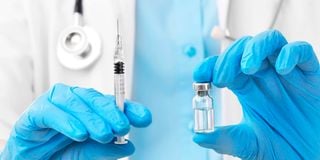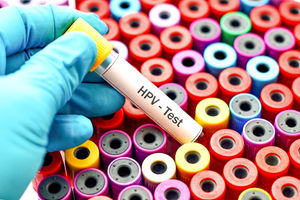Doctor, how often should I have a pap smear test?

A pap smear is a procedure to test for cervical cancer in women.
What you need to know:
- The natural history of cervical cancer takes many years, thus allowing for screening and treatment of any early lesions. Most of the time, the changes that lead to cervical cancer begin with infection with Human Papilloma Virus .
- According to the Kenya national cancer screening guidelines, any woman who has ever had sexual intercourse is eligible for cervical cancer screening.
Hi doc,
How often should women have a pap smear test for cervical cancer? I recently went to see a gynaecologist due to heavy menses and he advised that I take the test yet I had taken a similar one early last year.
Joan
Dear Joan,
Cervical cancer is a leading cause of disease and death for women and it is therefore vital to get cervical cancer screening regularly for early detection and treatment. The natural history of cervical cancer takes many years, thus allowing for screening and treatment of any early lesions. Most of the time, the changes that lead to cervical cancer begin with infection with Human Papilloma Virus (HPV). According to the Kenya national cancer screening guidelines, any woman who has ever had sexual intercourse is eligible for cervical cancer screening.
Women under 30 years of age: Pap smear is the recommended primary screening test, with re-screening every three to five years if the test is normal
Women over 30 years of age: Human papilloma virus (HPV) test is the recommended primary screening test. In case the test (or resources) are not available or there is risk of loss to follow up, then visual inspection with acetic acid (VIA) can be done.
Women 50 to 64 years: screening every five years using HPV testing or pap smears
Women >65 years: no screening, unless advised by the doctor
Women who have low immunity due to HIV or any other reason: screening every year if using pap smear or VIA, or once every two years if using HPV testing
During pregnancy and after delivery: screening can be done during the first trimester of pregnancy and from six weeks after delivery
Anyone who has received HPV vaccination should also be screened according to the guidelines.
Symptoms of cervical cancer include vaginal bleeding after intercourse, bleeding in between your periods or bleeding after menopause; a watery, blood stained discharge that has a foul smell, low abdominal pain or pain during intercourse. Therefore, doing cervical cancer screening is reasonable as one of the tests whenever there is abnormal bleeding. Heavy periods can also occur due to hormonal imbalance, dysfunction of the ovaries, uterine fibroids and other growths in the uterus including cancer, having an intra-uterine device/coil for contraception, having a bleeding disorder, other diseases like liver or kidney disease, or as a side effect to some medications.
It is advisable for you to be seen by a gynaecologist for a thorough evaluation to find the exact cause of the heavy bleeding and treat it.
My skin is very itchy. I have visited a dermatologist but the itchiness won’t go away. I always develop rashes after shaving. What could be wrong?
Sammy
Dear Sammy,
Itching all over the body can be caused by many illnesses. These include allergies, inflammatory skin conditions, skin infections, helminth infection (worms), diabetes, thyroid disease, liver disease, kidney disease, nerve disease, iron deficiency anaemia, HIV infection and some types of cancer. It can also occur as a reaction to medication, dryness of the skin or even due to aging.
To treat the itching, the underlying cause has to be identified and treated. There are also medications that can be given to help relieve the itching like antihistamines and steroids. Meanwhile, avoid scratching yourself as much as possible. You can place a cool cloth or ice over the area that is itching the most for a few minutes to relieve the itch. Use sunscreen when you are going out into the sun. Use mild soap and warm water to bathe, and not hot water. Use moisturising creams/lotion after taking a shower. Avoid clothes and beddings made from material that can trigger itching like wool and some synthetic fabrics. Instead, opt for cotton clothing and beddings.
Rashes on the head can be due to a wide range of causes ranging from pseudofolliculitis barbae (rashes that form as hair regrows after shaving), to inflammatory conditions and skin infections. It is not possible to tell the exact type of rash without more information or examination. Visit a skin specialist (dermatologist) for evaluation. A bit of the affected skin can also be scraped off and examined to determine the exact problem so that you can get proper treatment.
In the meantime, avoid shaving hair completely, wash your hair and scalp daily with a mild shampoo to remove dead cells and dirt. Also, avoid scratching your scalp because it irritates the skin, which may lead to more itchiness. Avoid over-drying your scalp for instance by being in the sun for long or poor hydration. If this doesn’t work, you can try medicated shampoos, leaving them for about five minutes before rinsing. You may need to try several until you find one that works for you.
My lips, especially the lower one, is really red and looks inflamed. What could be the problem and medication recommendation?
PM
Dear PM,
Inflammation of the lips is called cheilitis. The inflammation can cause redness, swelling, itchiness, pain, dryness, formation of scales or crusts, cracking or discolouration of the lips. Cheilitis can develop as a result of infection; recurrent biting and/or licking of the lips; Vitamin B12 or iron deficiency; ill-fitting dentures; sun exposure and other weather related changes; or allergic reaction to lipstick, lip balm, toothpaste, mouth wash, some foods, medication, metal and other materials. Smoking, a history of allergy and genetics may make some people more likely to develop cheilitis than others.
A doctor/skin specialist will check for potential triggers of the inflammation in addition to examining the lips. A test may be done, either to check for allergies, infection or through a tissue sample (biopsy). Treatment will depend on the most likely cause. An emollient like petroleum jelly, used in combination with a cream to treat infection or allergy, may be all that is needed. In case additional treatments are required, these will be prescribed depending on the underlying cause identified.
Send your health questions to:[email protected]




